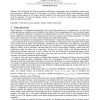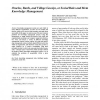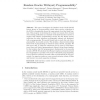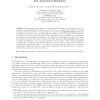199 search results - page 9 / 40 » Adaptive Proofs of Knowledge in the Random Oracle Model |
IJNSEC
2011
14 years 6 months ago
2011
Since Al-Riyami and Paterson presented certificateless cryptography, many certificateless schemes have been proposed for different purposes. In this paper, we present a certificate...
ISF
2000
14 years 11 months ago
2000
Knowledge management systems are used widely in many different organizations, yet there are few models and theories which can be used to help introduce and apply them successfully....
115
click to vote
ASIACRYPT
2010
Springer
14 years 9 months ago
2010
Springer
This paper investigates the Random Oracle Model (ROM) feature known as programmability, which allows security reductions in the ROM to dynamically choose the range points of an ide...
ISW
2007
Springer
15 years 5 months ago
2007
Springer
Abstract. We study the provable security of identity-based (ID-based) key agreement protocols. Although several published protocols have been proven secure in the random oracle mod...
CRYPTO
2001
Springer
15 years 3 months ago
2001
Springer
d Abstract) Philip MacKenzie and Michael K. Reiter Bell Labs, Lucent Technologies, Murray Hill, NJ, USA We describe a means of sharing the DSA signature function, so that two parti...




